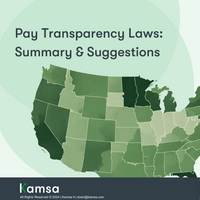
Pay Transparency Laws Summary & Suggestions
Keeping up with pay transparency laws can be complicated, especially when hiring remotely across various states across the United States.
Below are some of our favorite resources that provide a summary of U.S. pay transparency laws.
By Littler
Littler is an attorney group, headquartered in San Francisco, CA, that specializes in global employment and labor law practice. Littler’s Pay Equity Laws Map includes summaries of pay discrimination laws as well as pay transparency laws.
Pay Transparency Laws by State
By Salary Transparent Street
Founded by Hannah Williams and James Daniels, Salary Transparency Street broadcasts pay transparency through social media, making pay transparency main-stream. Formerly a data analyst, Hannah Williams interviews people on the street, asking them how much they make, their job title, and level of experience.
Salary Transparent Street’s Pay Transparency Laws by State & Jurisdiction resource on their website is thorough and presents various pay transparency laws throughout the United States.
By Fisher Phillips
Fisher Phillips is an attorney group, headquartered in Atlanta, GA, and they specialize in labor and employment matters.
Their interactive Pay Equity Map highlights the various states that prohibit salary history inquiries and require wage disclosure.
About Kamsa
Kamsa is a compensation management platform for employers to assess their employees' pay against the market and identify pay gaps. Built by compensation experts, Kamsa uses machine learning to match employees’ jobs to the market survey data, making it easy for employers to view compensation insights and make good pay decisions.


